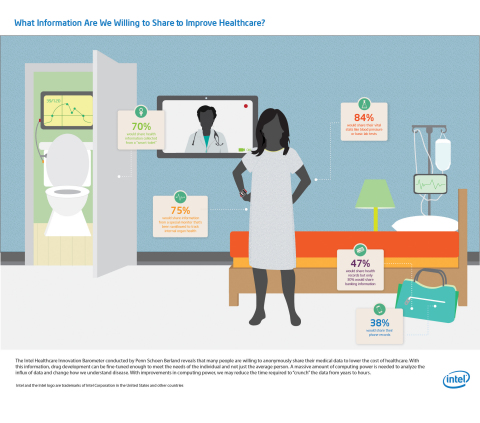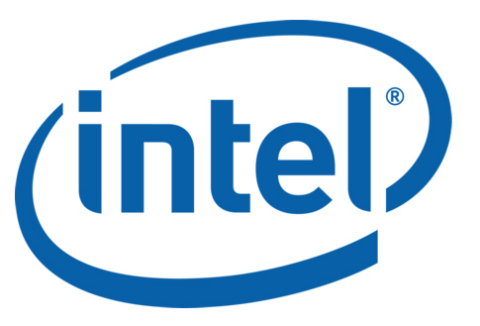SANTA CLARA, Calif.--(BUSINESS WIRE)--Most people are optimistic about technology innovations advancing healthcare, are willing to participate in virtual healthcare visits with their doctor, and would use health sensors in their bodies and even their toilets, according to a new study commissioned by Intel Corporation.
The “Intel Healthcare Innovation Barometer,” conducted across eight countries by Penn Schoen Berland, found the majority of people also believe that technology innovation holds the best promise for curing fatal diseases – more than increasing the number of physicians or additional funding for research.
“This survey indicates very high willingness of people to become part of the solution to the world’s healthcare problems with the aid of all sorts of technologies,” said Eric Dishman, Intel fellow and general manager of the company’s Health and Life Sciences Group. “Most people appear to embrace a future of healthcare that allows them to get care outside hospital walls, lets them anonymously share their information for better outcomes, and personalizes care all the way down to an individual’s specific genetic makeup.”
Intel’s research revealed that what people want most at the intersection of healthcare and technology is more personalized care based on their own behaviors and biology that provides the freedom to get healthcare wherever and whenever it’s convenient for them.
Personalization: Putting the “Me” into Medicine
More than 70 percent of respondents are receptive to using toilet sensors, prescription bottle sensors or swallowed monitors to collect ongoing and actionable personal health data. Sixty-six percent of people prefer a personalized healthcare regimen designed specifically for them based on their genetic profile or biology. And 53 percent of those surveyed said they would trust a test they personally administered as much or more than if it came from a doctor.
“Technologies such as high-performance computing and big data analytics have the power to change the face of health in this world, and most people seem to desire that,” Dishman said. “When given a choice between getting the same care as others who have their symptoms or getting care based on their own genetic profile, two in three respondents choose customized care.”
Sharing Information for Good
People indicated willingness to share their information to advance the field of medicine and lower costs for all. The survey revealed an overwhelming majority of people (84 percent) globally would anonymously share their personal health information, such as lab results, if it could lower medication costs or overall cost to the healthcare system.
“Improving healthcare is a team effort, including patients and their families,” added Dishman. “Intel’s research shows when people see benefits for them and their wider community, they are open to sharing sensitive information in anonymous ways.”
A higher percentage of people said they are more willing to share their health records (47 percent) than their phone records (38 percent) or banking information (30 percent) to aid innovation.
Hospital at Home
Fifty-seven percent of people believe traditional hospitals will be obsolete in the future. Technology innovation holds the promise of unburdening people from having to see a healthcare provider in person for many aspects of their healthcare management, liberating people from the conventional restraints of time and location.
“Care must occur at home as the default model, not in a hospital or clinic,” said Dishman. “New technologies can bring decision support, health monitoring and health coaches into the home. It was also interesting to see that people in emerging markets such as Brazil, China and India trusted themselves to use health monitoring technologies more than those in more technologically advanced economies such as Japan and the United States.”
Seventy-two percent of those surveyed are willing to see a doctor via video conference for non-urgent appointments. As remote healthcare technology and self-monitoring tools improve, people may embrace technologies that will allow them to connect with their caregivers in new ways, such as sensor technology that transmits health data in real time. Today’s technologies such as social networks and video conferencing can help people embrace new behaviors.
Intel Healthcare Innovation Barometer: Key Findings
Improving Personal Care and Self-Monitoring with Technology
- More than 70 percent of people globally are receptive to toilet sensors, prescription bottle sensors or swallowed monitors.
- Sixty-six percent of people say they would prefer a personalized healthcare regimen designed specifically for them based on their genetic profile or biology.
- Fifty-three percent of people say they would trust a test they personally administered as much or more than if performed by a doctor.
- About 30 percent of people would trust themselves to perform their own ultrasound.
Sharing Anonymous Digital Health Records for the Common Good
- People are more willing to anonymously share their health records or genetic information than their banking information or phone records.
- More than three-quarters (76 percent) of respondents over the age of 55 would be willing to anonymously share results of lab tests or health monitoring to contribute to research databases compared with 64 percent of millennials.
- India is the country most willing to share healthcare information to aid innovation.
Emerging Technology Tools for Increased In-Home Health Management
- Half of those surveyed would trust a diagnosis delivered via video conference from their doctor.
- Seventy-two percent are receptive to communication technologies that allow them to remotely connect to their doctor.
- The innovation least likely to be incorporated by the global population is a robot performing surgery.
- Almost half of respondents (43 percent) globally would trust themselves to monitor their own blood pressure and other basic vitals.
- Only 42 percent of Japanese respondents say the traditional hospital will become obsolete in the future compared with 57 percent of global respondents.
Survey Methodology
This survey was conducted online by Penn Schoen Berland on behalf of Intel in Brazil, China, France, India, Indonesia, Italy, Japan and the United States from July 28 to Aug. 15, 2013. It was conducted among a representative sample of 12,000 adults ages 18 and older with a margin of error of plus or minus 0.89 percentage points. For more information on the Intel Global Innovation Barometer visit www.intel.com/newsroom/healthcare.
About Intel
Intel (NASDAQ:INTC) is a world leader in computing innovation. The company designs and builds the essential technologies that serve as the foundation for the world’s computing devices. Additional information about Intel is available at newsroom.intel.com and blogs.intel.com.
Intel and the Intel logo are trademarks of Intel Corporation in the United States and other countries.
*Other names and brands may be claimed as the property of others.




